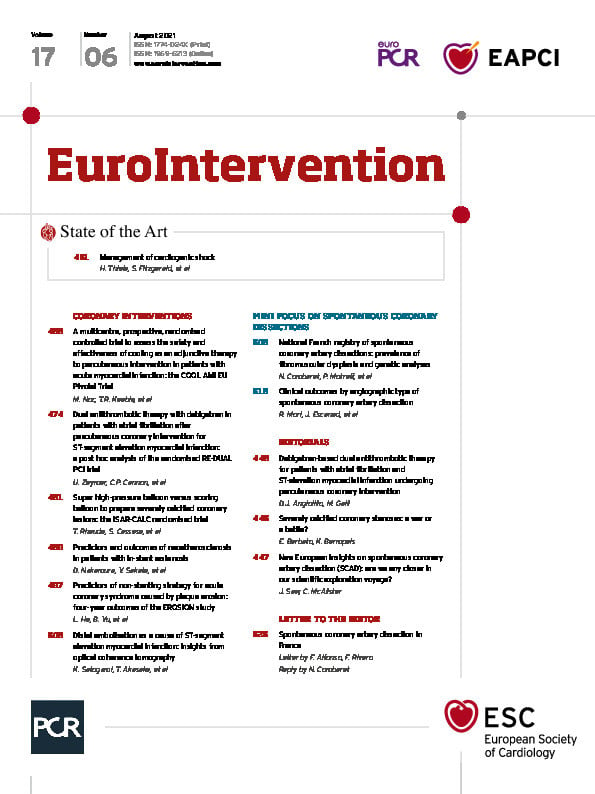We read with great interest the study by Combaret et al1 reporting the French registry on spontaneous coronary artery dissection (SCAD). This was a large ambispective study including 373 patients with SCAD from 51 clinical sites in France. Importantly, in all cases the diagnosis was confirmed in an angiographic core lab by experts on this condition. In addition, genetic studies were available in most patients, confirming the genetic association of this entity with the PHACTR1 locus1. Overall, demographic, clinical and angiographic findings were remarkably similar to those found in the prospective Spanish SCAD registry, including 318 consecutive SCAD cases (from 31 clinical sites), also confirmed in a centralised angiographic core lab2. In-hospital adverse events were low (5.4 vs 6%) in both national registries. In both registries an initial conservative strategy was used in most patients (84.2% in the French registry [79.1% at one year] and 78% in the Spanish registry) with satisfactory results1,2. In the Spanish registry, initial treatment with percutaneous coronary intervention (PCI) was independently associated with in-hospital adverse events. Likewise, in the French registry, patients initially treated with PCI had poorer one-year clinical outcomes compared with those receiving an initial conservative medical management (22.4% vs 10.2%, p<0.01)1. However, further details on the type and timing of these adverse events would be of major interest. In addition, information on whether or not clinical events were centrally adjudicated following uniform criteria (i.e., myocardial infarction) would be important. Moreover, if available, data on the number of patients requiring re-hospitalisation for acute coronary syndrome and unplanned repeat angiography for symptomatic recurrence or recurrent myocardial infarction would also be of great value. Although a conservative medical management is widely recommended whenever possible in SCAD patients3, it is clear that patients requiring immediate revascularisation have an adverse clinical and angiographic presentation, which may help to explain, at least in part, their unfavourable long-term clinical outcomes. Finally, it would be of great interest to know if treatment with beta-blockers or dual antiplatelet therapy provided any prognostic benefit in these patients.
International collaborative research efforts are warranted to advance our knowledge and improve the clinical management and the prognosis of patients presenting with this relatively rare yet intriguing and challenging clinical entity.
Conflict of interest statement
The authors have no conflicts of interest to declare.
Supplementary data
To read the full content of this article, please download the PDF.

